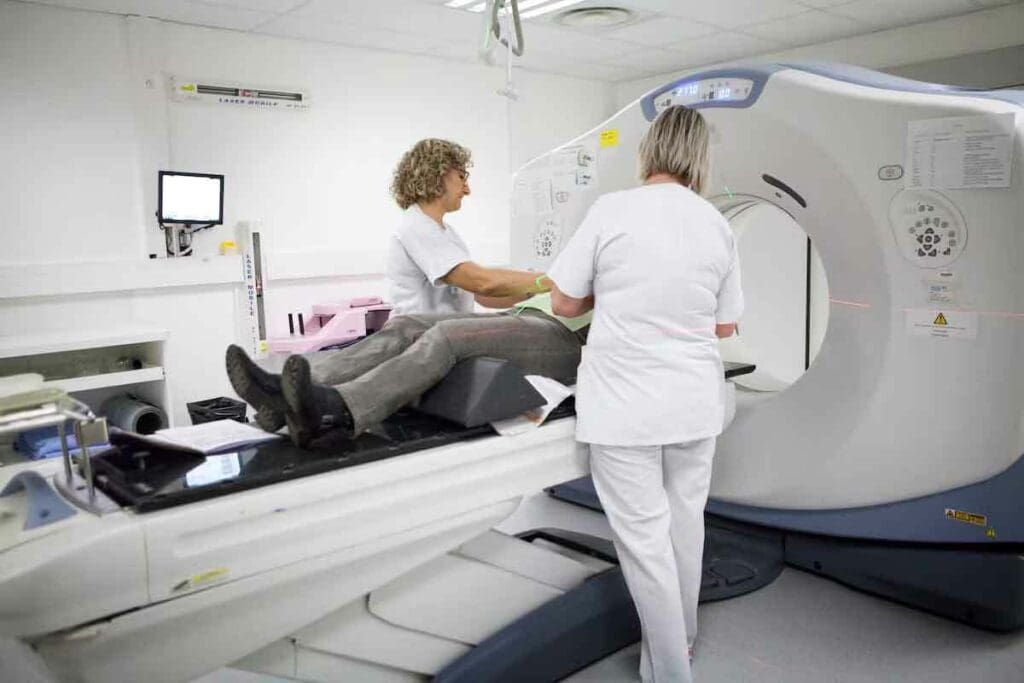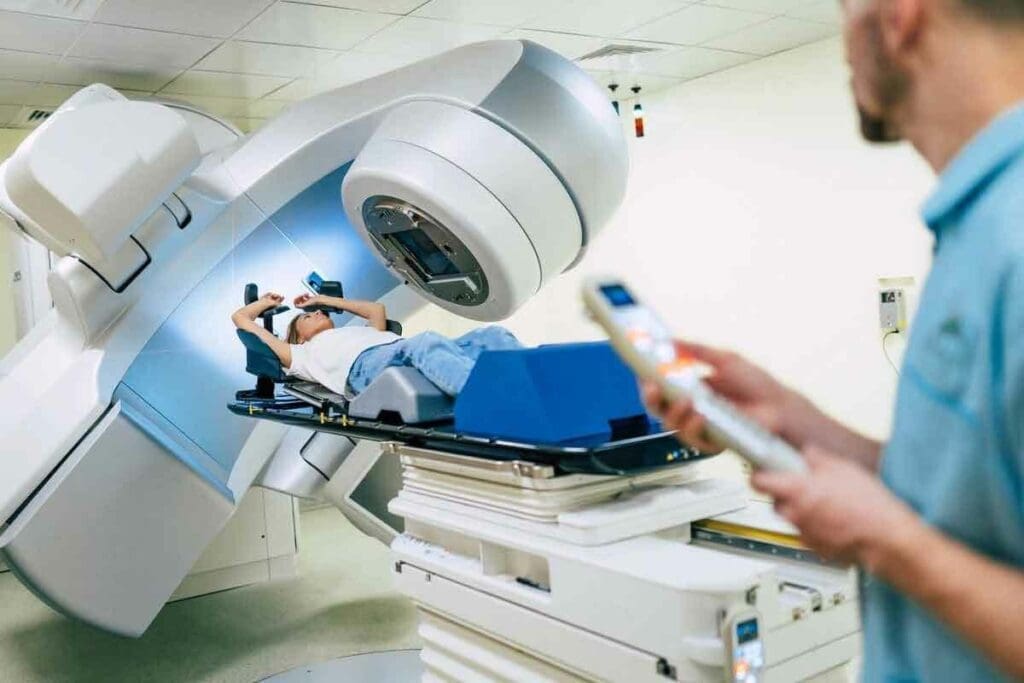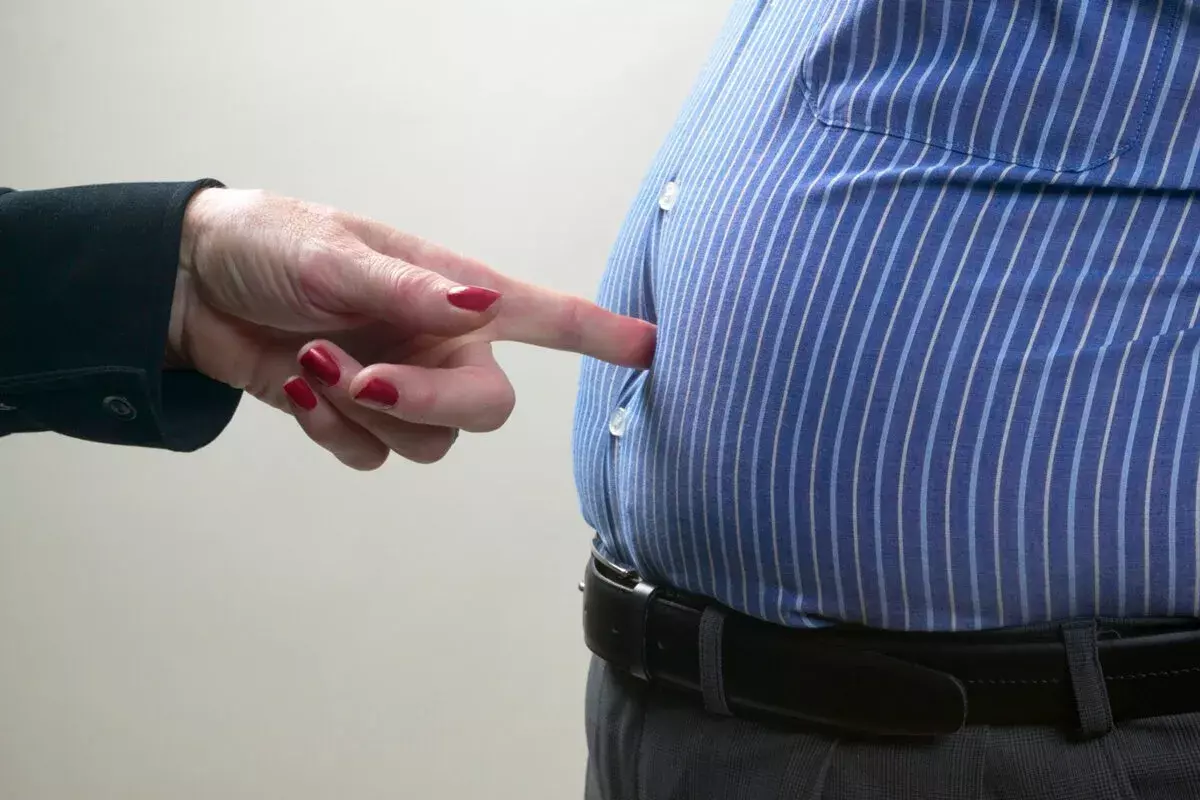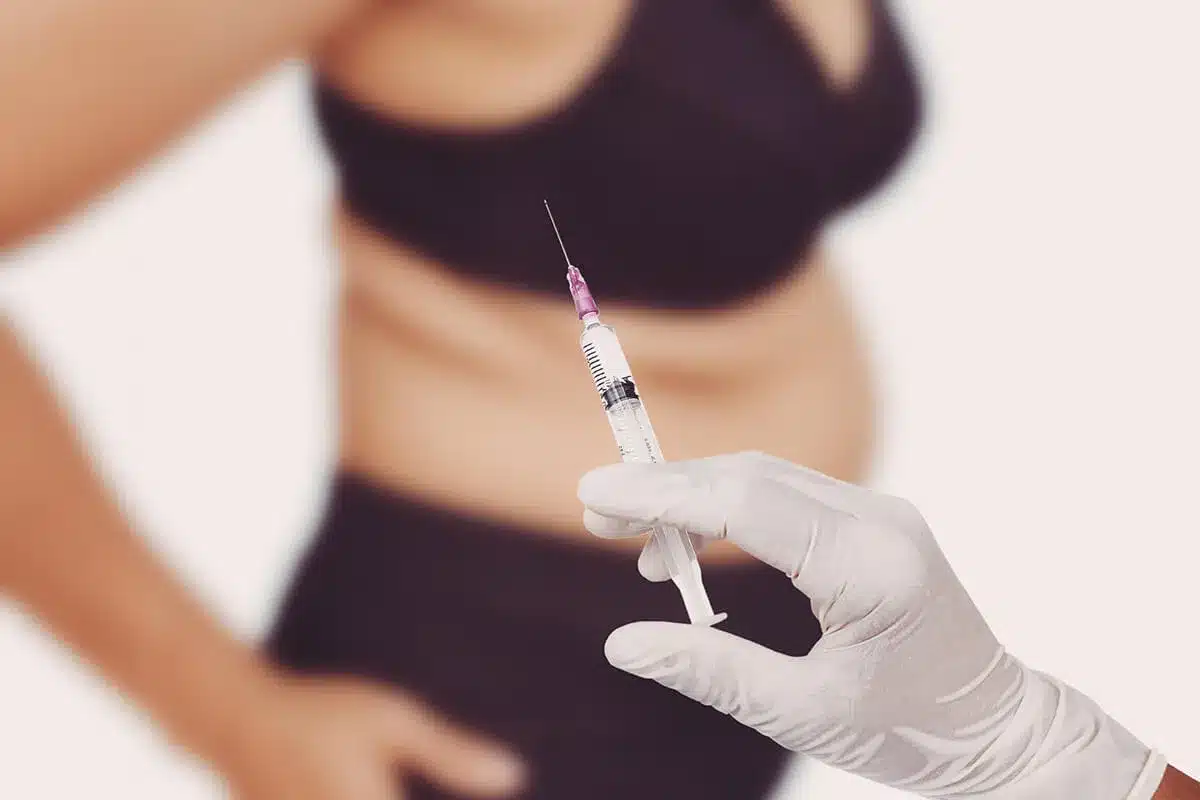
As we work to improve thyroid cancer treatment, knowing about radiation therapy risks is key. Patients getting radiotherapy face different side effects. It’s vital to be well-informed.
Thyroid radiotherapy side effects are an important topic for anyone undergoing treatment. Radioactive iodine therapy is a common treatment for thyroid cancers. It’s effective but comes with certain risks and complications before and after treatment.
At Liv Hospital, we guide our patients through every step of radiation treatment, helping them manage thyroid radiotherapy side effects with expert care and support. This article will discuss the 7 main risks of thyroid radiotherapy and how to handle them safely.
Key Takeaways
- Understanding the risks of radiation therapy is key for thyroid cancer patients.
- Radioactive iodine therapy is used to treat differentiated thyroid cancers.
- Various side effects can occur during and after radiotherapy treatment.
- Liv Hospital provides complete care and support for patients undergoing radiation treatment.
- Knowing about the risks and complications helps patients make informed decisions.
Types of Thyroid Cancer Radiation Treatments

There are several radiation therapy options for thyroid cancer. Each has its own benefits and risks. We will look at the main types of radiation treatments for thyroid cancer.
External Beam Radiation Therapy Explained
External beam radiation therapy (EBRT) is a non-invasive treatment. It uses high-energy beams to target and destroy thyroid cancer cells. This therapy is often used when the cancer has spread or is in a location that’s difficult to treat with surgery. EBRT is given over several sessions, allowing patients to recover between treatments.
Radioactive Iodine (RAI) Treatment Process
Radioactive iodine (RAI) treatment involves ingesting radioactive iodine capsules or liquid. The radioactive iodine is absorbed by the thyroid gland. The radioactive iodine destroys thyroid cells, including cancerous ones. This treatment is often used for thyroid cancer that has spread to other parts of the body. Patients undergoing RAI treatment must follow specific safety protocols to minimize radiation exposure to others.
Differences in Side Effect Profiles
While both EBRT and RAI are effective treatments, they have different side effect profiles. EBRT can cause localized side effects such as skin irritation and fatigue, whereas RAI treatment can lead to salivary gland dysfunction and other systemic effects. Understanding these differences is key for managing patient expectations and side effects.
Thyroid Radiotherapy Side Effects Overview

Radiation therapy for thyroid cancer can cause many side effects. These can happen right away or later. We’ll explain what you might experience during and after treatment.
Immediate vs. Delayed Reactions
Side effects from thyroid radiotherapy can be split into two groups. Immediate effects happen during or right after treatment. Delayed effects can show up months or years later.
Immediate reactions include feeling tired, nauseous, and having inflammation in the treated area. These usually go away once treatment ends.
Delayed reactions can last longer. They might harm the thyroid gland, salivary glands, and nearby tissues for a long time.
- Immediate side effects: fatigue, nausea, inflammation
- Delayed side effects: thyroid gland damage, salivary gland dysfunction, tissue fibrosis
Factors Influencing Side Effect Severity
Several things can affect how bad thyroid radiotherapy side effects are. These include the type and dose of radiation, your overall health, and any existing medical conditions.
The type and dose of radiation are key in determining side effect severity. External beam radiation and radioactive iodine treatment have different effects.
Patient-specific factors like age, health, and other medical conditions also play a role in side effect severity.
- Type and dose of radiation
- Patient’s overall health and pre-existing conditions
- Specific characteristics of thyroid cancer
Expected Duration of Common Side Effects
How long thyroid radiotherapy side effects last varies. Some go away quickly, while others can last for months or years.
Side effects like feeling tired and dry mouth can last weeks to months. Sometimes, these effects can last a long time or even become permanent.
Knowing about thyroid radiotherapy side effects is key. It helps manage expectations and improve life quality during and after treatment.
Risk #1: Salivary Gland Dysfunction
Thyroid radiation treatment can harm the salivary glands. This can make life harder, causing pain and hurting oral health. We’ll look into why this happens and how it affects patients getting thyroid radiotherapy.
Inflammation and Swelling Mechanisms
Radioactive iodine therapy can make salivary glands swell and get inflamed. This happens because the iodine also goes to the salivary glands, causing damage. Patients might feel pain and see swelling in their salivary glands.
Dry Mouth and Taste Alterations
Dry mouth, or xerostomia, is a common side effect of thyroid radiotherapy. It makes swallowing, speaking, and tasting food hard. Patients might also find food tastes different, which can be upsetting and affect their diet.
Long-term Salivary Gland Damage
Damage to the salivary glands can last a long time or even be permanent. This can cause dry mouth, more cavities, and other oral health problems. It’s important to see a dentist regularly and keep good oral hygiene. Patients should talk to their doctor about these risks and how to lessen them.
Knowing about the risks of salivary gland dysfunction helps patients prepare for treatment. Our team is here to give full care and support during treatment.
Risk #2: Thyroid Function Impairment
Thyroid radiotherapy can harm thyroid function. This harm can lead to hypothyroidism. The radiation affects the thyroid gland.
Temporary Hypothyroidism Development
Radioactive iodine therapy can cause temporary hypothyroidism. This is when the thyroid gland can’t make enough thyroid hormones. This happens because the gland gets inflamed or damaged by radiation.
We watch patients for signs of hypothyroidism. It can be treated with medicine. Sometimes, patients need thyroid hormone replacement for a short time.
Permanent Thyroid Damage Scenarios
Damage to the thyroid gland can be permanent. This means patients need thyroid hormone for life. The damage’s extent depends on the treatment dose and how the patient reacts.
Permanent damage shows the need for careful treatment and follow-up. This helps avoid long-term problems.
Lifelong Hormone Replacement Requirements
Patients with permanent damage need hormone replacement for life. They take synthetic hormones to replace what their thyroid can’t make.
We teach patients about their hormone replacement. They need to take their medicine as prescribed. Regular check-ups are also important to keep an eye on hormone levels.
Risk #3: Digestive and Oral Complications
Radiation therapy on the thyroid gland can cause many digestive and oral side effects. These issues can really affect a patient’s life during and after treatment. We will look at the common problems and how to deal with them.
Nausea and Gastrointestinal Distress
Many patients with thyroid cancer feel nauseous during radiation therapy. This is because the treatment affects the stomach. Gastrointestinal distress can show as nausea, vomiting, or changes in bowel habits. Eating small meals often can help manage these symptoms.
Some people might get esophagitis, which is inflammation of the esophagus. This can make swallowing hard. It’s important to manage nausea and stomach problems to keep nutrition and health up during treatment.
Mouth Ulcers and Oral Mucositis
Mouth ulcers and oral mucositis are common side effects of thyroid radiotherapy. Oral mucositis is when the mouth’s lining gets inflamed and ulcers. This can hurt and make eating and swallowing hard.
To lessen these problems, we tell patients to keep their mouth clean. Use gentle brushing and rinse with salt water. Also, avoid foods that are spicy or acidic to reduce pain.
Managing Eating Difficulties During Treatment
Eating can be tough for patients getting thyroid radiotherapy. We recommend soft, bland foods that are easy to swallow. Nutritional supplements can also help make sure they get enough calories and protein.
| Dietary Recommendations | Foods to Avoid | Nutritional Supplements |
| Soft, bland foods (e.g., yogurt, mashed potatoes) | Spicy, acidic, or sharp foods (e.g., citrus fruits, chips) | High-calorie, high-protein supplements |
| Easy-to-swallow foods (e.g., soups, scrambled eggs) | Hot or very cold foods and beverages | Consult a dietitian for personalized recommendations |
Knowing about the digestive and oral problems from thyroid radiotherapy helps patients prepare and manage them. Our healthcare team is here to support you every step of the way.
Risk #4: Voice and Swallowing Changes
Thyroid radiotherapy can lead to voice and swallowing changes. These changes can make daily tasks hard. Voice and swallowing issues need careful management and therapy.
Mechanisms of Vocal Cord Damage
External beam radiation therapy can harm the vocal cords. It causes inflammation and scarring. This can make the voice sound hoarse or raspy.
Dysphagia Development and Progression
Dysphagia, or trouble swallowing, is a side effect of thyroid radiotherapy. It makes swallowing food and liquids hard. This can lead to malnutrition and dehydration.
Long-term Voice and Swallowing Rehabilitation
Rehabilitation is key to improve voice and swallowing. We offer voice and swallowing therapy. Some patients need ongoing support to manage these issues.
Risk #5: Neck and Throat Discomfort
Thyroid radiotherapy can cause neck and throat discomfort. This discomfort can show up in many ways. Patients getting radiation for thyroid cancer may face symptoms that lower their quality of life.
Radiation-Induced Neck Tenderness
Many patients with thyroid cancer get neck tenderness from radiotherapy. This pain comes from inflammation caused by the radiation. It affects the neck tissues. A study on PMC shows managing these side effects is key to better patient outcomes.
Sore Throat and Pharyngeal Irritation
A sore throat is a common side effect of thyroid radiotherapy. It’s caused by irritation of the pharyngeal mucosa. This irritation can make swallowing painful, affecting a patient’s ability to eat and drink.
Tissue Fibrosis and Long-term Discomfort
Tissue fibrosis, or scarring, is a possible long-term effect of radiation therapy. For thyroid radiotherapy, it can cause lasting neck and throat discomfort. The extent of fibrosis varies among patients, based on the radiation dose.
| Symptom | Short-term Effects | Long-term Effects |
| Neck Tenderness | Inflammation and pain | Potential for chronic tenderness |
| Sore Throat | Pain while swallowing | Possible persistent irritation |
| Tissue Fibrosis | Initial scarring | Long-term discomfort and stiffness |
It’s important to understand these risks and their effects. This knowledge helps healthcare providers manage thyroid radiotherapy side effects better. By knowing about neck and throat discomfort, they can offer better support to patients.
Risk #6: Fatigue and Systemic Effects
Fatigue is a common side effect for many patients getting thyroid radiotherapy. It makes daily tasks hard and affects their quality of life.
Mechanisms of Radiation-Induced Fatigue
Radiation therapy can cause fatigue in several ways. It can lower red blood cell production, which is key for oxygen transport. It also causes inflammation and tissue damage, adding to tiredness.
Key factors contributing to radiation-induced fatigue include:
- Anemia due to reduced red blood cell production
- Increased levels of cytokines, which can promote inflammation and fatigue
- Hormonal changes, such as in thyroid function
- Nutritional deficiencies and changes in appetite
Impact on Quality of Life
Fatigue from thyroid radiotherapy deeply affects a patient’s life. Simple tasks become hard, and they may not enjoy activities they once loved.
“The fatigue was overwhelming. I felt like I was running a marathon every day, even when I was just doing simple tasks.” – Patient testimonial
We know managing fatigue is key to a good quality of life during and after treatment. Our healthcare team helps patients find ways to fight fatigue.
Recovery Timeline and Expectations
Recovery time for fatigue varies. Some patients feel better a few months after treatment, while others take longer.
| Timeframe | Expected Recovery Progress |
| 0-3 months post-treatment | Initial recovery phase; fatigue may be strong |
| 3-6 months post-treatment | Energy levels start to improve |
| 6+ months post-treatment | Most patients see a big drop in fatigue |
We stress the need for follow-up care to track recovery and manage side effects like fatigue.
Risk #7: Secondary Cancer Development
Radioactive iodine treatment is good for fighting thyroid cancer but has a risk of causing other cancers. This is something both patients and doctors need to think about when choosing treatments.
Statistical Risk Assessment
Research shows a small chance of getting other cancers after this treatment. The risk is low, but knowing the numbers helps make better choices.
Key statistics to consider:
- The risk of secondary cancers changes with the dose of radioactive iodine.
- Patients who get higher doses or need more treatments face a higher risk.
- Common cancers linked to this treatment are leukemia, salivary gland cancer, and bladder cancer.
A study in the Journal of Clinical Oncology says, “The risk of getting other cancers after this treatment is something to think about. It’s important to weigh this against the treatment’s benefits.”
“Using radioactive iodine to treat thyroid cancer has changed how we manage it. But, it comes with risks. Knowing these risks is key to taking care of patients well.”
-Endocrinologists highlight
Common Secondary Malignancies
The most common cancers linked to this treatment are:
- Leukemia
- Salivary gland cancer
- Bladder cancer
- Breast cancer (in some studies)
It’s important for patients to know about these risks. They should talk to their doctor about their own risk.
Long-term Surveillance Recommendations
Because of the risk of getting other cancers, it’s important to keep an eye on patients who have had this treatment. This might include:
- Regular check-ups with your doctor.
- Tests and scans to watch for signs of other cancers.
- Knowing the signs and symptoms of other cancers.
Following these steps helps catch any problems early. This is key to managing any secondary cancers.
In conclusion, while there’s a risk of getting other cancers, the benefits of this treatment often outweigh the risks. By understanding the risks and following up regularly, patients can stay safe and get the best results.
Rare but Serious Complications
There are rare but serious complications from thyroid radiotherapy. These are not common, but knowing about them is key for good care.
Nerve Damage and Neuropathy
Nerve damage, or neuropathy, can happen from thyroid radiotherapy. Radiation can harm nerves around the thyroid gland. This can cause numbness, tingling, or pain.
We watch patients for signs of neuropathy during and after treatment. Catching it early helps a lot.
Bone and Tissue Injuries
Radiation therapy can harm bones and tissues in the neck. Osteoradionecrosis is a rare but serious issue. It’s when radiation damages the bone. Tissue fibrosis can also happen, causing stiffness and limited neck mobility.
| Complication | Description | Management |
| Osteoradionecrosis | Radiation damage to bone | Conservative management, surgery in severe cases |
| Tissue Fibrosis | Scarring and stiffening of tissues | Physical therapy, pain management |
Fertility and Reproductive Concerns
Fertility is a big worry for patients getting thyroid radiotherapy, like with radioactive iodine (RAI). RAI can harm the gonads, affecting fertility in both men and women.
We talk to patients about keeping fertility before treatment. For some, talking to a fertility specialist is a big part of their care.
Conclusion: Minimizing and Managing Side Effects
It’s key to manage side effects for those getting thyroid radiotherapy, like radioactive iodine therapy. Knowing the possible side effects and how to handle them can really help. This can make a big difference in how well patients do.
Handling side effects well needs a team effort. We work with patients to create plans that fit their needs. This includes helping with issues like dry mouth and reducing the chance of getting cancer later.
Using careful planning, watching patients closely, and providing support can lessen side effects. This way, patients can go through their treatment feeling more confident. They can get the best results from their therapy.
FAQ
References
- Shim, S. R., Zaydfudim, V., Sosa, J. A., & et al. (2021). Cancer risk after radioactive iodine treatment for hyperthyroidism: a systematic review and meta-analysis. Journal of Endocrinological Investigation / PMC. https://www.ncbi.nlm.nih.gov/pmc/articles/PMC8449277/
- Persons, E. M., et al. (2025). The impact of radioactive iodine on outcomes among pediatric thyroid cancer patients: survival and second‐primary malignancy risk. Cancers (MDPI), 17(1), 107. https://www.mdpi.com/2072-6694/17/1/107
What are the main types of radiation treatments used for thyroid cancer?
There are two main types of radiation treatments for thyroid cancer. External beam radiation therapy uses beams from outside the body to target cancer cells. Radioactive iodine therapy involves taking radioactive iodine orally, which is absorbed by thyroid cells and cancer cells.
What are the common side effects of thyroid radiotherapy?
Common side effects include salivary gland dysfunction and thyroid function impairment. Digestive and oral complications, voice and swallowing changes, and neck and throat discomfort are also common. Fatigue and systemic effects can occur as well.
How does radioactive iodine treatment affect the salivary glands?
Radioactive iodine treatment can cause inflammation and swelling in the salivary glands. This leads to dry mouth, taste alterations, and long-term damage. The glands are damaged because the radioactive iodine is absorbed by them, not just thyroid cells.
Can thyroid radiotherapy cause permanent thyroid damage?
Yes, thyroid radiotherapy, including radioactive iodine treatment, can cause permanent thyroid damage. This often results in hypothyroidism, requiring lifelong hormone replacement therapy.
How can patients manage eating difficulties during thyroid radiotherapy?
Patients can manage eating difficulties by eating soft or liquid foods. Avoiding spicy or acidic foods is also helpful. Nutritional supplements may be needed. Staying hydrated and getting advice from a healthcare provider or dietitian is important.
What is the risk of secondary cancer development after thyroid radiotherapy?
There’s a small increased risk of secondary cancers after thyroid radiotherapy, mainly with radioactive iodine treatment. Leukemia and other cancers are common secondary malignancies. Long-term surveillance is recommended for patients who have undergone this treatment.
Are there any rare but serious complications associated with thyroid radiotherapy?
Yes, rare but serious complications include nerve damage, bone and tissue injuries, and fertility concerns. These are more likely with higher doses of radiation or in specific circumstances.
How can the side effects of thyroid radiotherapy be minimized and managed?
Side effects can be minimized and managed through regular follow-up appointments and healthy lifestyle habits. Supportive therapies may also be needed. Patients should work with their healthcare team to develop a personalized plan.
What is the recovery timeline for fatigue caused by thyroid radiotherapy?
The recovery timeline for fatigue varies by individual and treatment specifics. Fatigue may last weeks to months after treatment. It improves with rest, proper nutrition, and supportive measures.
How does thyroid radiotherapy affect voice and swallowing functions?
Thyroid radiotherapy can change voice and swallowing functions due to radiation effects. These changes can range from mild to significant difficulties. Rehabilitation strategies, like speech therapy, can help manage these effects.









